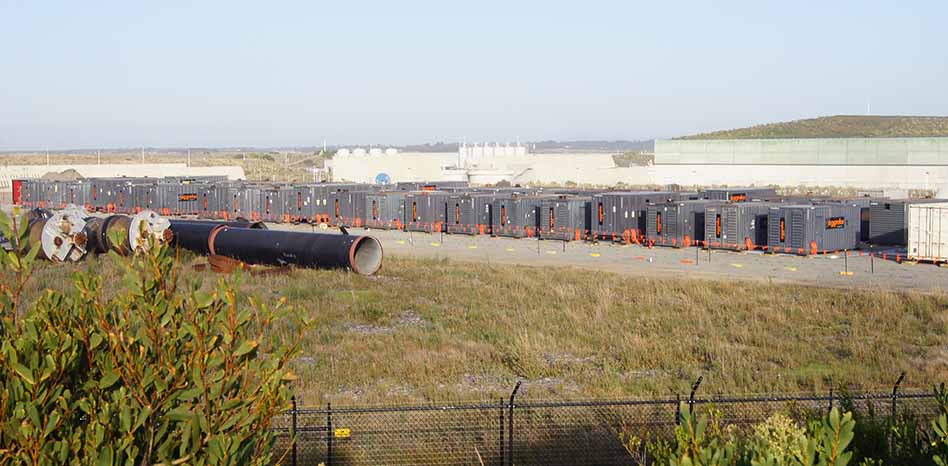 Thirty diesel generators could power up at the desal plant within a fortnight. Photo: Geoff Ellis
Thirty diesel generators could power up at the desal plant within a fortnight. Photo: Geoff Ellis DESALINATION plant operator AquaSure expects to know late next week whether it will need to fire up 30 diesel generators to meet a deadline to supply the first order of desalinated water from the Victorian Government.
If the plant’s electrical power supply can’t be fixed, the 1MW generators will burn a total of up to 150,000 litres of diesel fuel a day – four B double loads – to power the desalination process and pump the water to Cardinia Reservoir. They are expected to operate around the clock for up to a month.
Ironically, the plant’s energy is supposedly offset by green electricity generated by a wind farm in the western districts.
Watershed Victoria president Mark Robertson called on the State Government to cancel the $27 million order for water the state does not need.
“For a decade our community has been reassured that the plant will operate under world’s best practice – burning millions of litres of stinking diesel to produce water we do not need is anything but.”
After Bass Coast Shire Council sought an urgent meeting with AquaSure, Mayor Pamela Rothfield and CEO Paul Buckley were briefed by the company's CEO, Matt Brassington, on Tuesday about the generators and their potential impact on residents in the area.
Cr Rothfield said AquaSure was confident the repairs to the electrical power supply were on schedule and would be completed. If not, and the generators are required, they can only be activated following EPA approval, for a temporary 60 day permit, which at this stage has not been granted and would require 15 days’ notice prior to being activated.
“AquaSure have reassured us that if the generators are required, they will do everything in their power to minimise any potential impacts.”
AquaSure has offered relocation help and expenses to immediate neighbours of the plant who will be affected by the operation of the generators.
AquaSure must pump 50 gigalitres (50 billion litres) of water into the Cardinia Reservoir by June 30 or forgo the $27 million contract as well as a proportion of the $1.8 million a day service payment it receives to keep the plant operational. Water production was due to start in January but an 80-kilometre electricity transmission cable to the plant failed. Crews have spent much of last year digging up the underground cable to repair it.
In December, Water Minister Lisa Neville said the cost of repairs would be covered by the providers, AquaSure and AusNet.
The water order from the State Government is the first made since the plant was completed in December 2012. Although the plant was not required to produce water between 2013 and 2016, Victorians are still required to pay more than $600 million a year to AquaSure for 30 years to cover construction costs and a payment to ensure the plant is kept water-ready.
The alternative power supply comes at a high cost, financially and environmentally. The power-hungry desal plant uses up to 90MW to produce its maximum annual capacity of 150 gigalitres of water. When anti-desal campaigners focused on the high energy cost, the then Brumby Labor state government committed to offsetting energy use with electricity generated by a wind farm in the western districts.
The Labor state government announced the controversial desal plant in 2007, when Victoria’s water supplies were at an all-time low after 10 years of drought.
It signed a contract with a multinational consortium, AquaSure, to build the desal plant in July 2009 – and almost to the day the drought broke. In fact it was such a wet, cold, windy winter that construction of the plant was delayed. By the time the plant was finished in late 2012, Victoria’s dam levels were healthy and the water was no longer needed.
After Labor lost office in 2010, the Napthine Liberal state government studiously avoided ordering water in order to underline the “white elephant” status of the project.
With Labor back in office in 2014, they were understandably keen to show that it was in fact a wise investment to ensure Victoria’s water supply. The opportunity came last year, following a particularly dry spring and summer. Last March, with the state’s water storages at 63 per cent, the government made its first order, for 50 gigalitres (billion litres) of water to be supplied by June 30 2017.
Once again, Labor was unlucky with its timing. There followed a reasonably wet winter, followed by above-average rainfall in spring and summer. In the last week of summer, Melbourne’s total water storages now stand at a reasonably healthy 67 per cent.